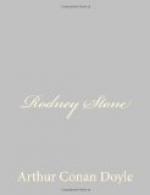I was quite abashed by the man’s flowery way of talking—so unlike anything which I had ever heard. He had a wizened face, and sharp little dark eyes, which took in me and the house and my mother’s startled face at the window all in the instant. My parents were together, the two of them, in the sitting-room, and my mother read the note to us.
“My dear Mary,” it ran, “I have stopped at the inn, because I am somewhat ravage by the dust of your Sussex roads. A lavender-water bath may restore me to a condition in which I may fitly pay my compliments to a lady. Meantime, I send you Fidelio as a hostage. Pray give him a half-pint of warmish milk with six drops of pure brandy in it. A better or more faithful creature never lived. Toujours a toi.—Charles.”
“Have him in! Have him in!” cried my father, heartily, running to the door. “Come in, Mr. Fidelio. Every man to his own taste, and six drops to the half-pint seems a sinful watering of grog—but if you like it so, you shall have it.”
A smile flickered over the dark face of the servant, but his features reset themselves instantly into their usual mask of respectful observance.
“You are labouring under a slight error, sir, if you will permit me to say so. My name is Ambrose, and I have the honour to be the valet of Sir Charles Tregellis. This is Fidelio upon the cushion.”
“Tut, the dog!” cried my father, in disgust. “Heave him down by the fireside. Why should he have brandy, when many a Christian has to go without?”
“Hush, Anson!” said my mother, taking the cushion. “You will tell Sir Charles that his wishes shall be carried out, and that we shall expect him at his own convenience.”
The man went off noiselessly and swiftly, but was back in a few minutes with a flat brown basket.
“It is the refection, madam,” said he. “Will you permit me to lay the table? Sir Charles is accustomed to partake of certain dishes and to drink certain wines, so that we usually bring them with us when we visit.” He opened the basket, and in a minute he had the table all shining with silver and glass, and studded with dainty dishes. So quick and neat and silent was he in all he did, that my father was as taken with him as I was.
“You’d have made a right good foretopman if your heart is as stout as your fingers are quick,” said he. “Did you never wish to have the honour of serving your country?”
“It is my honour, sir, to serve Sir Charles Tregellis, and I desire no other master,” he answered. “But I will convey his dressing-case from the inn, and then all will be ready.”
He came back with a great silver-mounted box under his arm, and close at his heels was the gentleman whose coming had made such a disturbance.
My first impression of my uncle as he entered the room was that one of his eyes was swollen to the size of an apple. It caught the breath from my lips—that monstrous, glistening eye. But the next instant I perceived that he held a round glass in the front of it, which magnified it in this fashion. He looked at us each in turn, and then he bowed very gracefully to my mother and kissed her upon either cheek.




